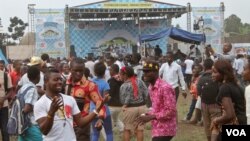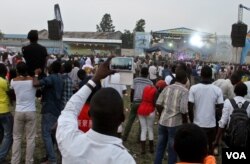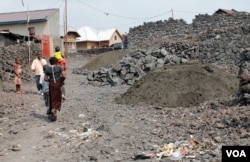Several years ago, fed up with the violence engulfing their region, a youth group in Goma set out to hold a music festival for peace. The first attempt in 2013 was canceled as mortars rained down on the city. But in 2014, 25,000 people came to Goma to hear their favorite Congolese artists play.
Now in its second year, the Amani Music Festival has started to attract some of the continent’s biggest names, despite recent clashes in the area.
The audience roars when Malian legend Habib Koite takes the stage. The smoke machines fire up and an impromptu conga line forms, while thousands of exuberant spectators eat, drink and dance in the dust.
Dreaming big
Music festivals are popular across Africa, though in bruised and battered Goma, this is a scene few would have imagined possible.
For decades Goma has been synonymous with crises. Desperate refugees converged on the city after the Rwandan genocide in 1994. In 2002 a nearby volcano buried part of the city in molten lava. Various rebel groups have taken and re-taken Goma in recent years, including M23, which was driven out of the area in 2013.
One ambitious youth group dared to imagine that their city could be different, however, and they seized on the idea of music.
Last weekend’s Amani Music Festival, now in its second year, has begun to attract some of Africa’s biggest musicians. Vianney Bisimwa, one of the youth group’s organizers, said they wanted to change the image of a town slowly clawing its way back to stability.
“We went through war, and the war really negatively impacted the promotion of culture," said Bisimwa. "So the idea was, how can we try to change the way people see this town? Because all the reports on DRC were, ‘don’t go there, people are killed, there is no way, no hope, no future.’”
If the D.R.C. is known for war, it is also famous for its music, and many local artists sing openly about the conflict. This allows people to process their feelings and to grieve, according to Bisimwa.
“Music is powerful in DRC. When people are tired, they go to dance. When people are angry they dance, or they sing about how they are angry. People believe in what they understand, what they hear,” said Bisimwa.
Musical transformation
According to some locals, life in Goma has started to get better.
Goma already has changed a lot from the days of M23, one man said, and people are hungry for peace.
Another Goma resident said nothing like this festival has ever been seen here before -- a sign the city is reestablishing itself.
Staging a music festival in Goma has not been easy. The first attempt, in 2013, was canceled when the city found itself under siege by M23 rebels in the surrounding hills.
The following year was more successful, though, with 25,000 people in attendance. Bisimwa said that for the local community, the festival became part of the healing process.
“People were really traumatized, there was a lot of frustration, there was anger. There were many things coming from this experience of this special year of struggling with M23. So the first edition was an opportunity for people to breath,” said Bisimwa.
Violence returned to Goma last month, as police opened fire on protesters rallying against changes in Congo’s electoral law. It is not always clear that Goma is making progress, said Bisimwa, with such tensions just beneath the surface.
Peace, he added, is a process. He said he hopes events like this finally will get people talking about the past, and thinking about the future.












